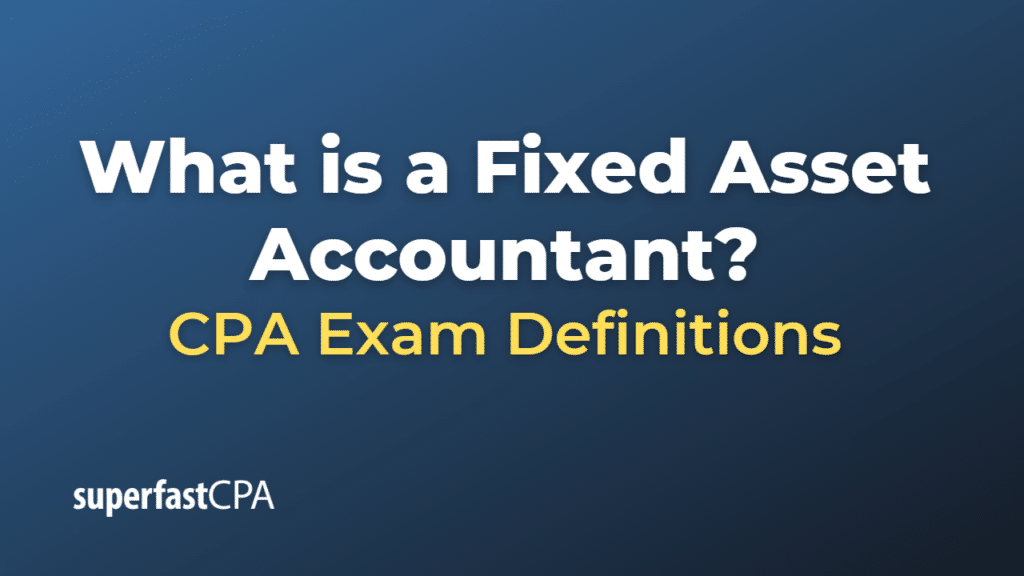Fixed Asset Accountant
A fixed asset accountant is a professional who manages and maintains a company’s fixed assets. Fixed assets, as we’ve discussed earlier, include long-term tangible assets like land, buildings, machinery, and equipment, as well as intangible assets like patents, copyrights, and trademarks.
The roles and responsibilities of a fixed asset accountant can vary widely depending on the size and nature of the business but generally include:
- Tracking Fixed Assets: Keeping an accurate inventory of all fixed assets, including details like purchase dates, costs, depreciation rates, and disposal dates if relevant.
- Calculating depreciation: Regularly calculating and recording the depreciation of each fixed asset over its useful life, according to the appropriate method (e.g., straight-line, declining balance, units of production).
- Recording Transactions: Recording the acquisition and disposal of fixed assets, and adjusting the fixed assets register to reflect these changes.
- Conducting physical counts: Coordinating or assisting in periodic physical counts of fixed assets to ensure the accuracy of the fixed asset register.
- Compliance: Ensuring compliance with relevant accounting standards and company policies related to fixed assets.
- Reporting: Preparing reports on fixed assets for management or external stakeholders, which could include details on the company’s capital expenditure, depreciation expense, or forecasts of future fixed asset investments.
In larger companies, the fixed asset accountant might be part of a larger finance or accounting team, while in smaller companies, these duties might fall to a general accountant or financial manager. The goal of the fixed asset accountant is to accurately represent the value of the company’s fixed assets in its financial records, which is crucial for both internal decision-making and external financial reporting.
Example of a Fixed Asset Accountant
Let’s consider a hypothetical scenario of a fixed asset accountant working for a large manufacturing company.
The company purchases a new piece of machinery costing $500,000, which is expected to have a useful life of 10 years with no salvage value. Here’s how the fixed asset accountant might handle this transaction:
- Tracking the Asset: The accountant records the new machinery in the company’s fixed asset register, noting the acquisition date, the cost, the expected useful life, and other relevant details.
- Calculating and Recording Depreciation: The accountant decides to use the straight-line method of depreciation for this asset. This means that the machine’s cost will be spread evenly over its 10-year life. Thus, the annual depreciation expense is $50,000 ($500,000 divided by 10). The accountant will record this $50,000 depreciation expense on the income statement each year and reduce the carrying value of the machine on the balance sheet by the same amount.
- Physical Verification: Once a year, the accountant coordinates a physical count of all fixed assets, including the new machine, to ensure the physical assets match the records in the fixed asset register.
- Reporting: The fixed asset accountant generates reports on the state of the company’s fixed assets, capital expenditures, and accumulated depreciation. These reports help management make decisions about future capital investments and provide necessary information for financial reporting and tax purposes.
- Disposal of the Asset: After 10 years, the machine has reached the end of its useful life and is sold off for $50,000. The fixed asset accountant records the disposal of the asset, removing it from the fixed asset register. The accountant would calculate any gain or loss on the sale of the asset (comparing the sale price to the asset’s book value at the time of sale) and record this on the income statement.
In this way, the fixed asset accountant ensures the accurate tracking, depreciation, and eventual disposal of the company’s fixed assets. They play a crucial role in maintaining the integrity of the company’s financial records and reports.












